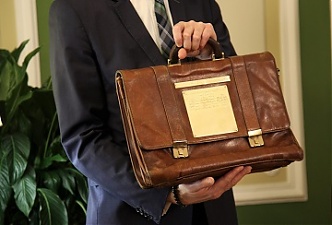Budget, Covid-19, Financial Services, Latvia, Legislation, Markets and Companies
International Internet Magazine. Baltic States news & analytics
Sunday, 06.07.2025, 00:20
Saeima in Latvia adopts budget 2021
 Print version
Print version |
|---|
The budget was adopted with 63 votes to 32.
Commenting on next year's budget, Prime Minister Krisjanis Karins (New Unity) thanked all the engaged parties and said that the bill has been developed during unprecedented times when Covid-19 pandemic has been seriously affecting people's lives.
Karins reminded that next year, despite the pandemic and economic difficulties, budget expenditure has been increased by more than EUR 300 million. "The overall tax load is reduced, the minimum wage has been increased to EUR 500, medics and teachers will see higher wages, the minimum pension and the guaranteed minimum income will be raised. Starting from July 1, minimum social insurance contributions will be introduced," he said.
The prime minister wished everyone excellent health and wished that 2021 were better than 2020.
Adoption of the 2021 budget took historically the longest time. The parliament started work on the budget on November 23, and spent 78 hours hearing it, including breaks in between, and the time allowed for debate had been reduced twice. This is also the first budget adopted partly remotely, using the new e-Saeima platform.
In total 142 proposals were submitted to next year's budget. Lawmakers did not support any of the proposals submitted by the opposition.
Revenue in the government basic budget is projected at EUR 6.68 billion and expenditure at EUR 7.84 billion. Revenue in the special budget is planned at EUR 3.15 billion and expenditure at EUR 3.17 billion.
Revenue in the consolidated budget will decline by EUR 328 million, while expenditure will rise by EUR 744 million, and the budget deficit is projected at 3.9% of the gross domestic product.
Under the budget bill, 75% of personal income tax revenue will go to local governments' budgets and 25% to the central government budget.
After hearing President Egils Levits' request that Saeima do not increase his salary, the Saeima supported this request. Saeima also has proposals on its agenda to freeze wages of the government members and parliamentary secretaries of ministries, but decisions on this proposals will be made later.
The health care sector has been allocated additional EUR 183 million.
Also, teachers will see an increase of wages next year, and additional EUR 33.3 million have been allocated for the purpose in 2021 and EUR 49.1 million in 2022 and following years.
In the welfare sector, EUR 95.7 million have been allocated to ensure the guaranteed minimum income to poor people, EUR 70.7 million to increase the minimum pension and state social insurance benefit, EUR 23.8 million in municipal budget have been earmarked for funding the guaranteed minimum income and housing benefit.
The pandemic crisis has pointed out the need to strengthen social protection of those people who have alternative tax regimes. Thus, starting from July, these employees will have to pay mandatory social insurance contributions. The regime of patent fees will be applied only on pensioners and disabled persons.
Starting from 2021, mandatory social insurance contribution will be cut by 1%age point to 34.09%. The tax paid by employees will be 10.5%, and the tax paid by employers will be 23.59%.
Also, there will be changes in the micro enterprise tax. Only the owner of the company will pay the micro enterprise tax, while the general tax regime will be applied on employees.
The minimum wage will be increased from EUR 430 to EUR 500. Income threshold up to which which differential non-taxable minimum is calculated has been raised from EUR 1,200 to EUR 1,800 per month. The maximum non-taxable minimum income till be increased from EUR 250 to EUR 300 a month. The non-taxable minimum income for pensioners will be increased from EUR 300 to EUR 330 a month.
The reduced value added tax (VAT) rate on Latvian fruit, berries and vegetables at 5% will be preserved until the end of 2023. Excise tax rate on tobacco will be increased by 5% a year in the coming three years.
GDP growth next year is planned at 5.1%, while in 2022 and 2023 at 3.1%.
The bill will come in force on January 1, 2021.
- 28.01.2022 BONO aims at a billion!
- 25.01.2021 Как банкиры 90-х делили «золотую милю» в Юрмале
- 30.12.2020 Накануне 25-летия Балтийский курс/The Baltic Course уходит с рынка деловых СМИ
- 30.12.2020 On the verge of its 25th anniversary, The Baltic Course leaves business media market
- 30.12.2020 Business Education Plus предлагает анонсы бизнес-обучений в январе-феврале 2021 года
- 30.12.2020 Hotels showing strong interest in providing self-isolation service
- 30.12.2020 EU to buy additional 100 mln doses of coronavirus vaccine
- 30.12.2020 ЕС закупит 100 млн. дополнительных доз вакцины Biontech и Pfizer
- 29.12.2020 В Rietumu и в этот раз создали особые праздничные открытки и календари 2021
- 29.12.2020 Latvia to impose curfew, state of emergency to be extended until February 7








 «The Baltic Course» Is Sold and Stays in Business!
«The Baltic Course» Is Sold and Stays in Business!

